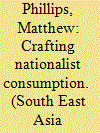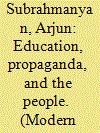| Srl | Item |
| 1 |
ID:
126656


|
|
|
|
|
| Publication |
2013.
|
| Summary/Abstract |
Following the revolution of 1932 that ended absolute monarchy in Siam, a new government came into power that sought to legitimize its rule by encouraging mass identification with the state. Practically, the expansion of a wage economy and the development of a state-led education system were seen by government officials as central to promoting a sense of citizenship to as yet disinterested rural communities. Throughout its first decade in power, the government thus set up projects to provide such groups with skills that might contribute to their overall material advancement. Following the lead of similar endeavours, particularly in India, one of the principal ways in which it would do this was through the production and bringing to market of cotton textiles. However, with foreign imports both superior in quality and cheaper than anything produced internally, the state struggled to establish a public relations message that might convince consumers to purchase Thai-produced textiles. As a result of specific limitations rooted in Thailand's ambiguous status globally, this meant that Thai leaders struggled to replicate the success of such movements elsewhere
|
|
|
|
|
|
|
|
|
|
|
|
|
|
|
|
| 2 |
ID:
140294


|
|
|
|
|
| Summary/Abstract |
On the morning of 24 June 1932 the ‘People's Party’, a small group of civil and military bureaucrats, toppled the Thai absolute monarchy and introduced constitutional democracy. This article discusses the establishment of democracy as an endeavour in ‘democratic paternalism,’ by which is meant the Party's attempt to establish a new moral and intellectual leadership that had as its main goal the creation of a depoliticized democratic citizenry. To implement their programme for democracy, the Party embarked on an ambitious plan to modernize education and explain popular sovereignty through countrywide lectures and radio programmes. The democratic paternalist effort had mixed results. State weakness limited the reach of the educational and propaganda campaigns, and further the ‘people’ in whose name the revolution was staged, constituted two different groups: a largely illiterate peasantry and a small, incipient new intelligentsia. Because of its limited capacity, the People's Party tasked the second group with assisting in democratic mentorship of the masses, but many in this second category of people had a broader conception of democracy than the Party's ‘top-down’ model and criticized the Party for its paternalist constraints on popular sovereignty. Democratic paternalism and frustration with the limits imposed on popular democracy are two central aspects of this period of history that have endured in Thai society.
|
|
|
|
|
|
|
|
|
|
|
|
|
|
|
|